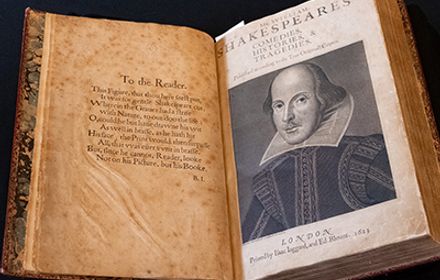
General
A discussion of the First Folio with James Evans
21 Apr 2023

Your 5-minute guide

We’ve done the research, so you can bluff your way through. Here’s a quickfire guide to all the thrills, spills, and chills of Romeo and Juliet. Compiled by Andy McLean.
The story of Romeo and Juliet in five simple steps.
Meet the characters in the play
Juliet The young, wide-eyed daughter of Capulet and Lady Capulet. Juliet is way smarter than she is given credit for, and like most teenagers, she’s fed up with being told what to do.
Romeo Oh Romeo, Romeo. Where do we even start with Romeo? The teenage son of Montague and Lady Montague is impulsive, idealistic, and prone to wild bouts of passion.
Benvolio Cool, calm, and collected, Benvolio is Romeo’s cousin and BFF. (He’s a bit like a little angel sitting on Romeo’s shoulder.)
Mercutio Bang on cue, here comes the little devil sitting on Romeo’s other shoulder. Mischievous Mercutio is neither Capulet nor Montague, but he always brings the party.
Tybalt Of all the Capulets, Tybalt probably has the most beef with the Montagues. Always spoiling for a fight.
The Nurse Like a surrogate mother to Juliet, the Nurse has her heart in the right place, her head in the clouds, and her sense of humour in the gutter.
Prince Escalus The top dog in Verona has had a gutful of the strife between the Montagues and Capulets.
Count Paris The Prince’s kinsman is Verona’s most eligible bachelor. Squeaky clean and keen to please. (Try saying that fast five times.)
Capulet and Lady Capulet Juliet’s parents command the Capulet clan and loathe the Montagues. They’re eager to earn some brownie points with the Prince and marry their daughter off to Count Paris.
Friar Laurence Slightly naïve but well-intentioned, the Friar wishes everyone could just get along. Also dabbles in alternative medicine.
Everyone knows how this play ends – including some of the characters...
If you’re one of those people who starts a novel by flicking to the final page to find out how it ends (gasp! How could you?), then Romeo and Juliet is your jam. This play is so famous that most people know how it ends, even if they’ve never seen it.
And that’s exactly what Shakespeare would have wanted. He made certain that every audience member knows the ending, right from the start. The play opens with a prologue that tells us exactly what we’re about to see: a family feud that ends after two young lovers perish.
As the play unfolds, even some of the characters seem to know what’s coming. To pick just two examples: Romeo says he has a hunch that attending the Capulet ball will lead to his “vile forfeit of untimely death”. And later in the play, when the lovers part ways, Juliet has a premonition of Romeo “as one dead in the bottom of a tomb”.
By giving the audience all these spoiler alerts, Shakespeare is toying with us. We are unable to intervene and are forced to watch, helpless, as events spiral out of control. We witness everything – from romance to heroism, from violence to comedy – in the certain knowledge that this will only end one way: tragedy.
Romeo and Juliet is packed with famous lines and phrases